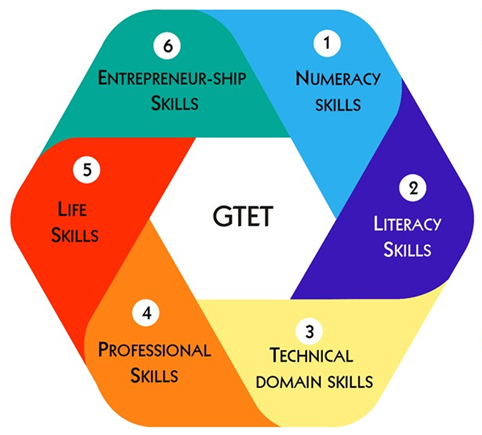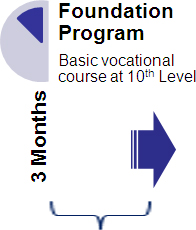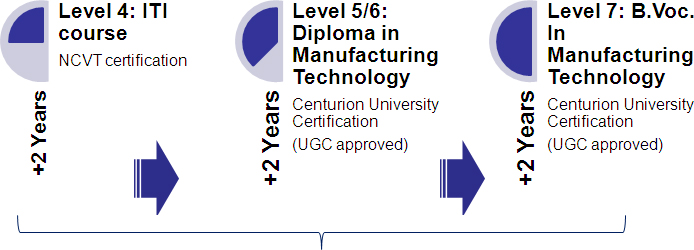Three phases of learning – our training methodology

PHASE I: TRADITIONAL LEARNING
TEACH ME
Traditional learning methods of building a function for the course which involve development of trade specific knowledge, literacy, numeracy & technical skills.
SHOW ME
Learning through practical demonstration in workshop or work environment where trainees will observe tasks and procedures being completed, making notes along the way and understand SOPs.
PHASE II: APPLIED LEARNING
LET ME PRACTICE
As the saying goes… practice makes perfect! Industry specification machines & production environment for hands on learning and working on the pratical elements of doing the job.
PHASE III: ACTION LEARNING
ASSESS ME & TELL ME HOW I AM DOING
Assessment is a continuous process with daily assessment of practical learning on dimensions of accuracy, process & time taken.
LET ME SHOW YOU WHAT I CAN DO
Trainees turn to demonstrate learning and independently practice the learning from doing jobs & practical while producing a good or service of social-economic value in a live production environment.
RECOGNIZE ME
Skill championship to build competitive spirit and recognize the high performers of each batch, Independent IIIrd party assessment through sector skill councils or NCVT for final certification of a new “professional”.
Six Dimensions of Skills
Entrepreneurial Skills:
Encouraging students to gain hands on experience & through live production & incubating them to become nano/mini/micro entrepreneurs.
Life Skills:
Abilities for adaptive and positive behavior that enable individuals to deal effectively with the demands and challenges of work life & employment like IT literacy, financial planning for self and family, health, hygiene & sanitation.
Professional skills
The key behaviors, actions and thinking processes necessary to build a successful career like values, ethics, integrity, teamwork, communication, planning, time management & leadership etc.

Numeracy Skills:
Ability to use mathematical understanding and skills to solve problems and meet the demands of the job e.g. workshop measurement, calculation & basic arithmetic.
Literacy Skills:
Capacity to read, understand and appreciate various forms of communication including spoken language, printed text and digital media required for the industry & trade.
Technical domain skills
Trade specific technical or core knowledge & practical skills required for expertise in a trade.
End State: Career pathing through lifelong learning

- 10th Pass youth mobilized from rural areas Foundation Course as per curriculum followed by on the job training opportunity with industry partner
- Alternate pathway for 10th Fail through NIOS

Work Integrated Learning
Through a combination of:
- Contact Classes @ training room in factory or near the hostel
- e-learning/self learning through content developed by Gram Tarang
- Practical- job work in workshop or nearby ITI identified by Gram Tarang
- Assignments, Presentations
- On the job training & job appraisal
Assessments & Certification conducted by
- DGT for ITI level (Level 3 & Level 4)
- Centurion University for Diploma/Advanced Diploma & B.Voc. as per UGC guidelines under DDU Kaushal Kendra scheme